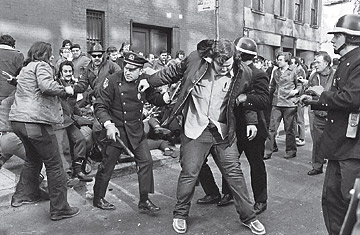
Striking telephone company workers clash with police in midtown Manhattan here Jan. 12 when authorities tried to arrest an employee who allegedly broke windows in a telephone company vehicle during a demonstration.
Among the many gray areas and judgment calls in law enforcement, disorderly conduct is one of the fuzziest. Just ask Harvard professor Henry Louis Gates Jr., arrested July 16 after yelling accusations of racism at an officer responding to a reported break-in at his home. Statutes outlining the misdemeanor are designed to help police maintain authority, and they are broadly worded; deciding what constitutes disorderly conduct is typically at an officer's discretion.
Disorderly conduct has its roots in the mid--19th century, when police officers needed a way to quell street brawls that erupted between immigrants and nativist groups, like the 1849 riot at New York City's Astor Place Theatre that killed 22 people. Like all aspects of modern-day policing, it has its roots in British common law. While used in cases of individuals, disorderly conduct is just as common in group arrests--at, for instance, abortion clinics, rallies and political conventions. At New York City's 2004 Republican National Convention, more than 1,100 people were arrested in a four-hour period, many for disorderly conduct.
Under the First Amendment, talking trash--what police acidly call "contempt of cop"--isn't by itself punishable unless you alarm a crowd while doing it. Thus, many cases are eventually dropped, as Gates' was. Nor is his the first to carry overtones of discrimination: Rosa Parks was convicted after she refused to give up her bus seat to a white passenger in 1955.
While some say the laws' broad definition leaves them open to abuse, Tom Nolan, a former officer and Boston University criminal-justice professor, begs to differ. "Police pride themselves on resolving issues, and 99% of the time it occurs without arrests," he says. Disorderly conduct charges are made when "there really isn't any other choice."
